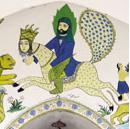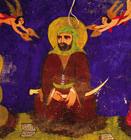Does Islam REALLY Prohibit Depictions of Mohammed (PBUH/SAW/TM)?
 Many in the West, including yours truly, have been puzzled by the extreme reaction to the Jyllands-Posten cartoons. The Muslim talking heads have explained that the extreme reaction to the cartoons arises out of a sacred and universal tenet of Islam--namely, that any depiction of the prophet Mohammed in any form is the epitome of blasphemy to any Muslim.
Many in the West, including yours truly, have been puzzled by the extreme reaction to the Jyllands-Posten cartoons. The Muslim talking heads have explained that the extreme reaction to the cartoons arises out of a sacred and universal tenet of Islam--namely, that any depiction of the prophet Mohammed in any form is the epitome of blasphemy to any Muslim.As I've read more about this issue, I've become more and more skeptical of this claim. I found, for example, this question posted to Ali al-Sistani, a powerful Shi'ite Imam in Iraq:
The answer, according to the Imam, is:Is it permissible to draw or produce a scene which shows the Prophet Muhammad (s.a.w.), one of the past prophets or the infallible Imams (a.s.), or other luminaries and show it in cinema, on television or theatre?
If due deference and respect is observed, and the scene does not contain anything that would detract from their holy pictures in the minds [of the viewers], there is no problem.
This Wikipedia article has more on the issue.
 So, at least some Muslims don't subscribe to the "no pictures rule." From what I can gather, it's more or less a Sunni rule and generally not adhered to by the Shi'ites. I've heard you can even buy pictures of Mohammed on the streets of that free-for-all of moral decadence known as Tehran. There are a lot of what are represented as Persian and Afghani depictions of Mohammed here. To characterize what is in reality a Sunni rule as a sacred universal rule of Islam is either misinformed or simply dishonest. Further, to the extent the "no pictures rule" is subscribed to by certain Muslims, it isn't specific to Mohammed alone, but applies to all living things, including "the prophets." Thus, a picture of Jesus or Moses is also forbidden to the devout fundamentalist Sunni. So, why no protests over pictures of the "prophet" Jesus?
So, at least some Muslims don't subscribe to the "no pictures rule." From what I can gather, it's more or less a Sunni rule and generally not adhered to by the Shi'ites. I've heard you can even buy pictures of Mohammed on the streets of that free-for-all of moral decadence known as Tehran. There are a lot of what are represented as Persian and Afghani depictions of Mohammed here. To characterize what is in reality a Sunni rule as a sacred universal rule of Islam is either misinformed or simply dishonest. Further, to the extent the "no pictures rule" is subscribed to by certain Muslims, it isn't specific to Mohammed alone, but applies to all living things, including "the prophets." Thus, a picture of Jesus or Moses is also forbidden to the devout fundamentalist Sunni. So, why no protests over pictures of the "prophet" Jesus?
 So, at least some Muslims don't subscribe to the "no pictures rule." From what I can gather, it's more or less a Sunni rule and generally not adhered to by the Shi'ites. I've heard you can even buy pictures of Mohammed on the streets of that free-for-all of moral decadence known as Tehran. There are a lot of what are represented as Persian and Afghani depictions of Mohammed here. To characterize what is in reality a Sunni rule as a sacred universal rule of Islam is either misinformed or simply dishonest. Further, to the extent the "no pictures rule" is subscribed to by certain Muslims, it isn't specific to Mohammed alone, but applies to all living things, including "the prophets." Thus, a picture of Jesus or Moses is also forbidden to the devout fundamentalist Sunni. So, why no protests over pictures of the "prophet" Jesus?
So, at least some Muslims don't subscribe to the "no pictures rule." From what I can gather, it's more or less a Sunni rule and generally not adhered to by the Shi'ites. I've heard you can even buy pictures of Mohammed on the streets of that free-for-all of moral decadence known as Tehran. There are a lot of what are represented as Persian and Afghani depictions of Mohammed here. To characterize what is in reality a Sunni rule as a sacred universal rule of Islam is either misinformed or simply dishonest. Further, to the extent the "no pictures rule" is subscribed to by certain Muslims, it isn't specific to Mohammed alone, but applies to all living things, including "the prophets." Thus, a picture of Jesus or Moses is also forbidden to the devout fundamentalist Sunni. So, why no protests over pictures of the "prophet" Jesus?I don't know the answers to any of these questions. We generally have to rely on the "Muslim talking heads" to explain this stuff to us, but at least in this case, their answers just don't seem to fit the facts.
I think the reality of the situation is closer to the following: Muslims don't like others making fun of their religious icons any more than Christians or Jews like people making fun of theirs. The difference in their reactions doesn't originate in some sacred and universal Islamic ban on idolatry. It grows out of an overdeveloped sense of moral superiority and religious entitlement.

0 Comments:
Post a Comment
<< Home